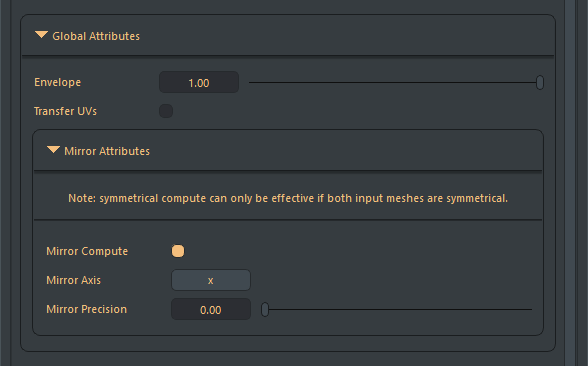Open a scene with the two meshes you want to register, and open the UI.

Select the reference mesh + the target one (the one to be deformed), and click on the ‘+’ button.
The node will be created, and various connections made. The UI will refresh and display the default attributes to start with. For meshes with same topology, the registration sections will be hidden.
Information section:
It displays basic information about all connected meshes and allows you to pick them.

Global Attributes

- Envelope:
Controls the global envelope attribute for the node. - Transfer UVs:
If checked, the UVs of the reference mesh will be transferred in world space on the matched result. Note that the transfer UV uses Maya standard nodes and can significantly slow down the registration process, so make sure to check this only if needed, and after you have a full registration.
Mirroring options:
The plugin automatically computes symmetry tables for both meshes, enhancing performance when both are symmetrical—almost all operations are effectively halved.
Be aware that modifying these parameters will trigger a full recompute, so you might want to set your iterations to zero before modifying them.
Symmetry Check:
When you connect the meshes to the node inputs, a report on their symmetry is generated and displayed in the information section. If mirror compute is enabled but the meshes are not symmetrical, it will automatically be deactivated.Adjusting Tolerance:
If you expect your meshes to be detected as symmetrical, you can modify the tolerance. Note that altering any mirroring attribute will trigger a full recompute of all steps, so be sure to set your iterations to zero before testing. If the symmetry check still fails to recognize your meshes as symmetrical, you may need to re-symmetrize them using Maya’s built-in tools.
Parameters:
- Mirror Compute:
Default: Enabled
When enabled and if the meshes are symmetrical, the solvers compute data for one side only and mirror it internally. - Mirror Axis:
Default: ‘x’
Specifies the axis used for symmetry. - Mirror Tolerance:
Default: 1e-4 * mesh size
This tolerance is scale aware, so in most cases, no adjustments are needed.